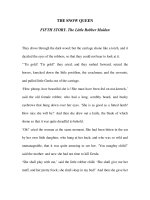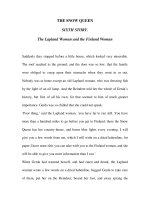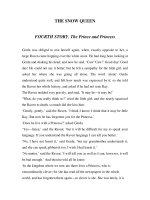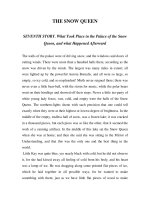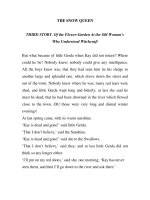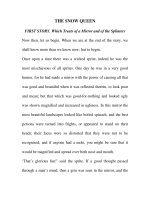Tài liệu THE SNOW QUEEN - FIRST STORY. and SECOND STORY ppt
Bạn đang xem bản rút gọn của tài liệu. Xem và tải ngay bản đầy đủ của tài liệu tại đây (32.24 KB, 14 trang )
THE SNOW QUEEN
FIRST STORY. Which Treats of a Mirror and of the Splinters
Now then, let us begin. When we are at the end of the story, we
shall know more than we know now: but to begin.
Once upon a time there was a wicked sprite, indeed he was the
most mischievous of all sprites. One day he was in a very good
humor, for he had made a mirror with the power of causing all that
was good and beautiful when it was reflected therein, to look poor
and mean; but that which was good-for-nothing and looked ugly
was shown magnified and increased in ugliness. In this mirror the
most beautiful landscapes looked like boiled spinach, and the best
persons were turned into frights, or appeared to stand on their
heads; their faces were so distorted that they were not to be
recognised; and if anyone had a mole, you might be sure that it
would be magnified and spread over both nose and mouth.
‘That’s glorious fun!’ said the sprite. If a good thought passed
through a man’s mind, then a grin was seen in the mirror, and the
sprite laughed heartily at his clever discovery. All the little sprites
who went to his school—for he kept a sprite school—told each
other that a miracle had happened; and that now only, as they
thought, it would be possible to see how the world really looked.
They ran about with the mirror; and at last there was not a land or a
person who was not represented distorted in the mirror. So then
they thought they would fly up to the sky, and have a joke there.
The higher they flew with the mirror, the more terribly it grinned:
they could hardly hold it fast. Higher and higher still they flew,
nearer and nearer to the stars, when suddenly the mirror shook so
terribly with grinning, that it flew out of their hands and fell to the
earth, where it was dashed in a hundred million and more pieces.
And now it worked much more evil than before; for some of these
pieces were hardly so large as a grain of sand, and they flew about
in the wide world, and when they got into people’s eyes, there they
stayed; and then people saw everything perverted, or only had an
eye for that which was evil. This happened because the very
smallest bit had the same power which the whole mirror had
possessed. Some persons even got a splinter in their heart, and then
it made one shudder, for their heart became like a lump of ice.
Some of the broken pieces were so large that they were used for
windowpanes, through which one could not see one’s friends.
Other pieces were put in spectacles; and that was a sad affair when
people put on their glasses to see well and rightly. Then the wicked
sprite laughed till he almost choked, for all this tickled his fancy.
The fine splinters still flew about in the air: and now we shall hear
what happened next.
SECOND STORY. A Little Boy and a Little Girl
In a large town, where there are so many houses, and so many
people, that there is no roof left for everybody to have a little
garden; and where, on this account, most. persons are obliged to
content themselves with flowers in pots; there lived two little
children, who had a garden somewhat larger than a flower-pot.
They were not brother and sister; but they cared for each other as
much as if they were. Their parents lived exactly opposite. They
inhabited two garrets; and where the roof of the one house joined
that of the other, and the gutter ran along the extreme end of it,
there was to each house a small window: one needed only to step
over the gutter to get from one window to the other.
The children’s parents had large wooden boxes there, in which
vegetables for the kitchen were planted, and little rosetrees besides:
there was a rose in each box, and they grew splendidly. They now
thought of placing the boxes across the gutter, so that they nearly
reached from one window to the other, and looked just like two
walls of flowers. The tendrils of the peas hung down over the
boxes; and the rose-trees shot up long branches, twined round the
windows, and then bent towards each other: it was almost like a
triumphant arch of foliage and flowers. The boxes were very high,
and the children knew that they must not creep over them; so they
often obtained permission to get out of the windows to each other,
and to sit on their little stools among the roses, where they could
play delight fully. In winter there was an end of this pleasure. The
windows were often frozen over; but then they heated copper
farthings on the stove, and laid the hot farthing on the
windowpane, and then they had a capital peep-hole, quite nicely
rounded; and out of each peeped a gentle friendly eye—it was the
little boy and the little girl who were looking out. His name was
Kay, hers was Gerda. In summer, with one jump, they could get to
each other; but in winter they were obliged first to go down the
long stairs, and then up the long stairs again: and out-of-doors
there was quite a snow-storm.
‘It is the white bees that are swarming,’ said Kay’s old
grandmother.
‘Do the white bees choose a queen?’ asked the little boy; for he
knew that the honey-bees always have one.
‘Yes,’ said the grandmother, ‘she flies where the swarm hangs in
the thickest clusters. She is the largest of all; and she can never
remain quietly on the earth, but goes up again into the black
clouds. Many a winter’s night she flies through the streets of the
town, and peeps in at the windows; and they then freeze in so
wondrous a manner that they look like flowers.’



